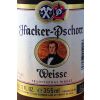Hacker-Pschorr Bräu - Hefe Weisse Natürtrub
-
ABV:
5.5% -
Int’l Bittering Units (IBUs):
16 -
Serving Temperature:
45-50° F -
Suggested Glassware:
Weizen Glass
This brew is intriguing right off the bat, as the orange color is quite deep for a (non-dunkel) hefeweizen. As expected, it’s hazy with suspended yeast, and the beer is also highly carbonated, per the style. The aromas that burst forth are quintessential hefeweizen; look for prominent banana and clove notes, a light bready character, a touch of bubblegum, and spicy hop and yeast notes. The aromas come through in the flavor too, with perhaps a bit more clove apparent in the mouth and a nice citric/spicy hop bitterness that lingers for a moment in the finish, clearing the palate. Using a 60/40 split between wheat malt and barley malt, plenty of wheaty tanginess is apparent on the palate without getting out of balance. Sweetness and tartness challenge each other, but neither dominates the other. A wonderful example of perhaps Bavaria’s most iconic style, this hefeweizen (known more typically as “hefe weisse” in Bavaria) pairs well with oysters on the half shell, lobster tail with lemon and butter, ceviche, or, to stay with the Bavarian theme, weisswurst. Prost!
Like so many breweries in the great beer heaven that is Germany, the Hacker-Pschorr (pronounced sort of like “Hocker Pshor” – the “P” is not silent) brewery’s heritage stretches back centuries. The year 1417 saw the founding of a brewery in Munich, which eventually came into the hands of the Hacker family when Simon Hacker purchased the establishment in 1738. Not surprisingly, he called his brewery Hacker Bräu. Around 1793, Josef Pschorr married Maria Theresia Hacker, daughter of Hacker Bräu owner Peter Paul Hacker. Soon, Josef purchased the brewery from his father-in-law, and you’re probably thinking that’s when the name changed to Hacker-Pschorr. But not so. Instead, Joseph founded another brewery in 1820, which he then named Pschorr. Upon his death, each brewery passed into the hands of one of his two sons, and the brands remained separate for well over a century.
In 1972, Hacker Bräu and Pschorr Bräu finally merged, bringing the family together again, so to speak – although the brands still sold separately for several years. Now, the brands are united, and a total of 13 different varieties of beer are produced under the Hacker-Pschorr label. Additionally, they’re one of just six breweries allowed to serve beer at Oktoberfest. Sporting two beer tents, including the huge Hackerzelt (a.k.a. Himmel der Bayern – “Heaven for Bavarians”) with its iconic blue-sky-with-clouds ceiling and 10,000 seating capacity, Hacker-Pschorr is one of the most consumed beers at the festival. If you can read German and would like to learn more, visit them at www.hacker-pschorr.de.

Unmatched Variety by style, brewery & country
Choose from Five different Beer Clubs offering unmatched variety by brewery,
country of origin, and beer style to suit your specific tastes.


